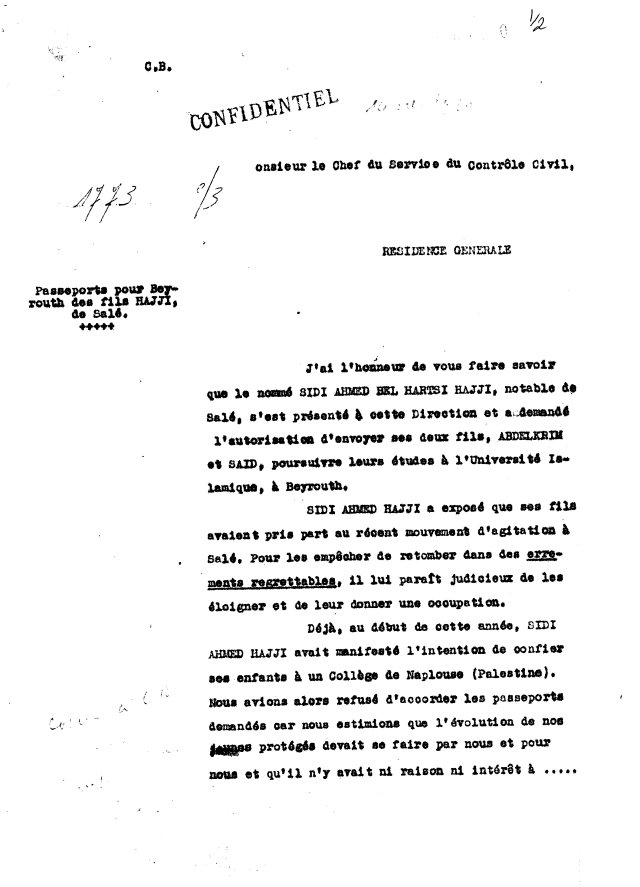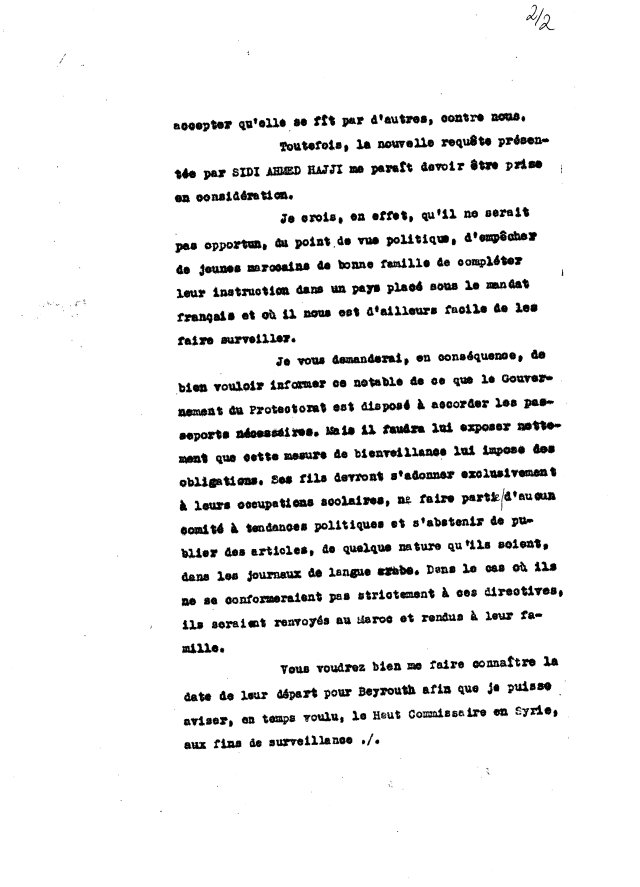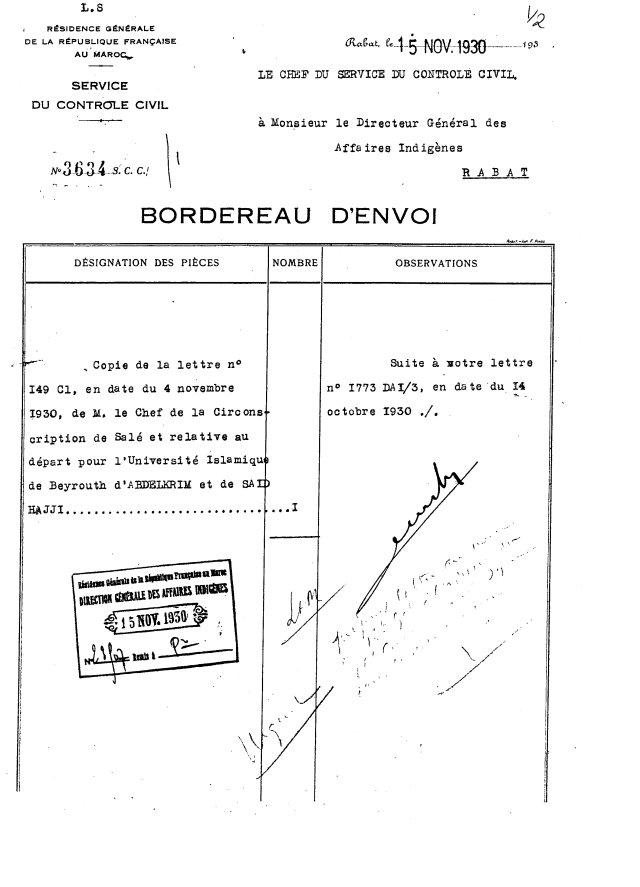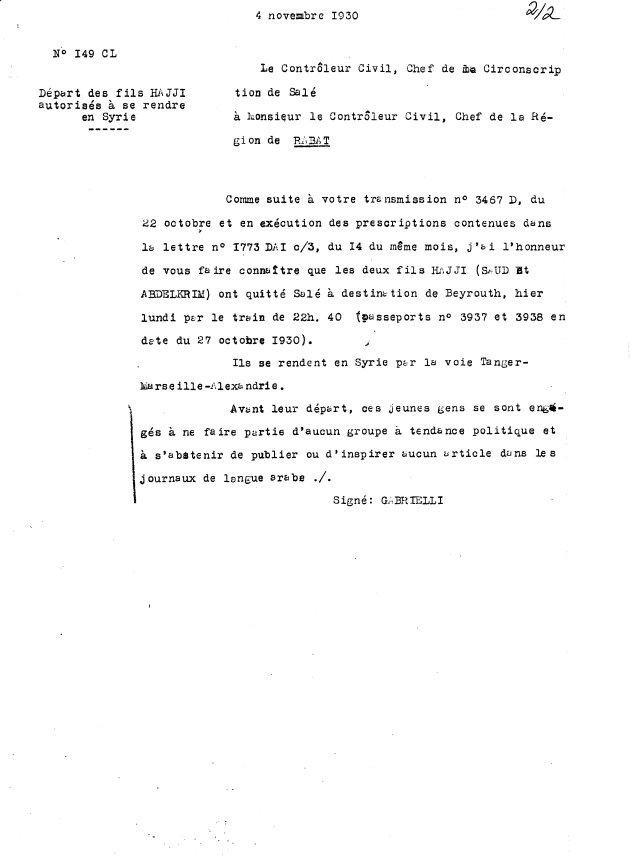-
Memorandum from the Chief of Public Order - General Residence
October 14, 1930
I have the honor to inform you that the one who goes by the name Ahmed Hajji, a notable of de Salé, has presented himself to this agency and requested the authorization to send his two sons, Abdelkrim and Said, to pursue their studies at the Islamic University in Beirut.
Previously during the early part of this year, Sidi Ahmed Hajji had made known his intention to entrust his sons to a school in Nablus, Palestine. We refused to authorize the requested passports because we believed that the development of our young protégés should be done by us and for us and there was neither a good reason or interest to accept that it be done by others, who are against us. In any case, the new request presented by Sidi Ahmed Hajji, appears to me to be worth consideration. In fact, I believe that it would be inopportune from a political viewpoint to prevent young Moroccans of families of good bearing from completing their education in a country under French mandate and besides is one where it will be easy to keep an eye on them.
Consequently I request that you kindly inform this gentlemen of whether the Protectorate Administration is disposed to provide the necessary passports. However one must clearly reveal to him that this friendly act requires of him certain obligations. His sons must exert exclusively to their scholarly pursuits, to not participate in any organization with political leanings and must abstain to write any articles no matter their nature in Arabic newspapers. In the event that they do not conform strictly to these guidelines, they will be sent back to Morocco and returned to their family.
You will be kind to inform me of the date of their departure to Beirut so I can alert in time, the High Commissioner of Syria, to perform the necessary surveillance.
-
The Chief Controller of Public Order Service to Chief Executive Officer of Indigenous Affairs
Dispatch sent on November 15, 1930 consisting of the transmission of the letter by the head of the district of Salé dated November 4, 1930 with regards to the departure of Abdelkrim and Said Hajji for the Islamic University of Beirut. This letter bears the signature of Mr. Gabrielli and is addressed to Chief of Public Order for Rabat Province.
As a follow up to your Dispatch No. 3467 D of October 22 and in executing the instructions in the letter No. 1773 DAI of the 14th of the same month, I have the honor to inform you that the two Hajji sons, Said and Abdelkrim, have left Salé for Beirut last Monday on the 22:40 train (passports 3937 and 3938 delivered on October 27, 1930). They will reach Syria using the Tangiers-Marseille-Alexandria route. Before their departure they were advised to not participate in any group with political leanings and not to publish any article in the Arabic newspapers.
-
Letter from Resident Genaral Lucian Saint to the High Commissioner of the French Republic in Syria and Lebanon.
November 25, 1930
I have the honor to inform you that the two brothers Abdelkrim and Said Hajji have left Salé on November 3 heading to Beirut via Tangiers-Marseille-Alexandria. These two young men, French nationals[23], holders of passports No. 3937 and 3938 delivered on October 27, 1930 have declared their intent to go to Beirut to pursue their studies at the Islamic University. Even though they participated in the protest movement which occurred following the public announcement of the decree of May 16, 1903 with regards to the organization of a Berber justice system, I did not believe I should deny them their wish.
In any event, they have been advised before their departure to exert themselves exclusively to their scholarly occupation. to not participate in politically motivated groups and to abstain from writing articles of any nature in the Arabic newspapers. in the event they deviate from these guidelines and they disrespect their commitments, I would be much obliged to you to alert me.


To the Chief of Public Order Services -- General Residence

The Chief of Public Order Sevices to the General Administrator of Indigenous Affairs

The Controller of Public Order of Salé to the Controller of Public Order of the Rabat region.
[23] This is an incorrect designation since Moroccan natives retained their national citizenship during the French protectorate.




